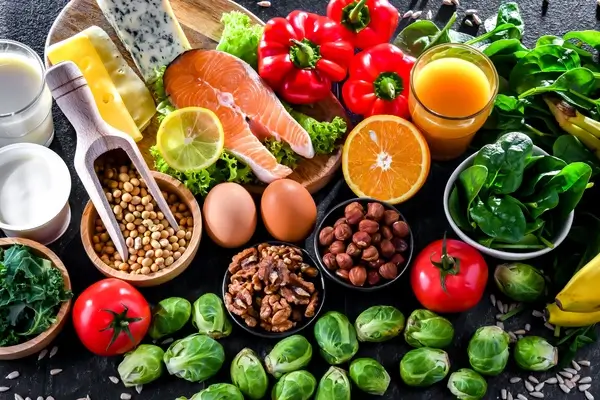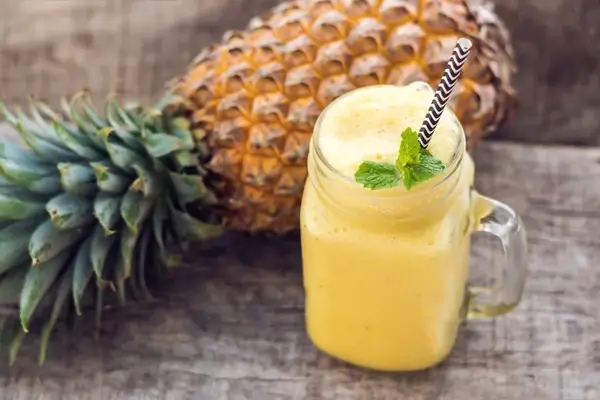You might think that a glass of milk every now and again is enough to promote healthy bones, but – and here comes the spoiler – it isn’t!
As part of Bone and Joint Awareness Week, we’re taking a look at the best foods and vitamins for bone health.

What affects bone health?
A number of different factors can affect bone health. These include but aren’t exclusive to:
- Maintaining a healthy weight – being over or underweight can put excess stress on your bones and joints
- Calcium – the amount of calcium in your diet is directly related to bone health. If your calcium intake is low, try to include more dairy products in your diet. We’ll explore the benefits and sources of calcium in more detail below
- Exercise – the more active you are, the more likely you are to have strong bones. So, make sure you start to include some exercise in your week if you don’t already
- Smoking and drinking to excess – unfortunately, research does suggest that regularly drinking more than one unit of alcohol a day (or two for men) can lead to poor bone health. If you enjoy a tipple at the weekend, try to make sure you have a few alcohol-free days during the week.
What vitamins do we need for strong bones?
If you’re concerned that you tick a few of the boxes above, there are plenty of ways to boost your intake of vitamins to make your bones nice and strong. We explore a selection of them below.
B12 and bone health
What does it do?
Low levels of vitamin B12 can make your bones brittle which, in turn, can increase your risk of fractures. Increasing your intake of vitamin B12 can help promote your mineral bone density.
How much do you need?
The general advice is to take around 2.4 micrograms of vitamin B12 per day.
Where can I find it?
Vitamin B12 can be found in fish and poultry. Whether you love it or hate it, it can also be found in Marmite in high doses.
Vitamin D and bone health
What does it do?
Vitamin D is key to helping your body absorb calcium. Together, they both provide protection against diseases like osteoporosis which weaken the bones.
How much do you need?
Between 15 and 20 micrograms per day. If you’re over the age of 70, you may be recommended a slightly higher dose.
Where can I find it?
Vitamin D can be found in plentiful supply in cod liver oil. Just one teaspoon of cod liver oil can provide you with over half of your necessary daily intake of vitamin D. Vitamin D supplements are also a sure-fire way of making sure you get your daily requirement.
Calcium
What does it do?
In terms of health, calcium is like a superfood. The following are proven benefits to regularly taking the mineral:
- helping build strong bones and teeth
- maintaining good heart health
- clotting blood
- maintaining good muscle function.
How much do you need?
Anything over 1,000 milligrams per day is good. Young children may need more while their bones are developing. To give some context, there is about 125mg of calcium in a glass of milk.
Where can I find it?
From rye bread to a good old fashioned glass of milk, calcium can be found in lots of different types of food. Cheese and yoghurts are high in calcium, as are most kinds of leafy greens. However, if you’re after calcium, be sure to avoid spinach. The calcium in spinach cannot be absorbed by the body.
Magnesium
What does it do?
Magnesium is crucial for maintaining healthy muscles, bones, and nerves. It can also help the body maintain good blood sugar levels. People that don’t get enough magnesium in their diet may be at a higher risk of developing diabetes and osteoporosis.
How much do you need?
The general advice is to take between 300-400mg of magnesium per day. Pregnant women may be advised to take more than this.
Where can I find it?
The good news is that magnesium is found in a whole load of different foods. Ginger and bananas are especially high, as are leafy greens, nuts, seeds, and wholegrains.
Vitamin K
What does it do?
Vitamin K is another important element in the building and maintenance of healthy bones. It helps to prevent the development of osteoporosis and regulates blood clotting.
How much do you need?
An adult needs the equivalent amount of vitamin K in their daily intake as their weight in kilograms. For example, if you weigh 80 kilograms, you’re likely to need 80 micrograms of vitamin K.
Where can I find it?
Vitamin K1 can be found in most foods, including:
- kale
- grapes
- broccoli
- cabbage
- lettuce
- blueberries.
Vitamin K2 is a little trickier to find, but is contained in foods such as:
- dairy
- pork
- beef
- chicken
- egg yolk.
Why not try the following delicious recipe?

Anti-inflammatory smoothie
Ingredients:
- 200g of fresh pineapple
- 250ml coconut milk – transfer to a large glass with ice
- 1 tablespoon of ginger root
- 1/2 teaspoon of turmeric powder
- Blend
- Pour the smoothie into a glass with ice and enjoy!
Benefits:
- Pineapple has an anti-inflammatory effect and may speed up recovery from traumatic injuries
- Ginger may improve neuralgic pain and inhibit inflammatory enzyme systems. Ginger also helps to settle the stomach
- Turmeric contains the yellow-pigmented anti-inflammatory known as curcumin. Curcuma extracts are used to help manage conditions such as arthritis, trauma, and inflammation secondary to infection.
Choosing the right bone health supplements
The best bone health supplements to take varies depending on the requirements and personal circumstances of the person. For example, pregnant women may need a higher dose of magnesium, whereas older adults may not need as much calcium as babies.
As a rule, one of the best bone supplement vitamins to take is vitamin K2. There is plenty of evidence to conclude that taking it as a supplement can improve bone density.
What’s the best diet for bone health?
As always, the best diet is a balanced one. Leafy greens and fish oil can provide plenty of nutrients to keep the bones and joints healthy, but it’s important not to overlook the importance of red meat and carbs, especially if you’re an active person.
Top foods for bone health
The best foods to eat to promote good bone health are:
- leafy greens
- grapefruit
- blueberries
- fatty fish
- nuts, seeds, and wholegrains
- grapes
- pork
- beef.
Foods to avoid for healthy bones
Foods high in salt (or sodium) can cause you to lose calcium, which in turn, leads to a loss of bone density. Avoid eating too much processed and canned food as these tend to be high in salt.
Alcohol and bone health
The good news is that enjoying a nice tipple at the weekend isn’t going to cause your skeleton to crumble! However, drinking to excess can have serious implications for your bone health. Avoid regular binge drinking to help your bones stay strong and healthy.
Bone and joint health FAQs
Not quite found the information you’re looking for? Our bone health FAQs may be able to help!
You can improve your bone health by maintaining a balanced diet. Be sure to include plenty of calcium and magnesium, along with vitamins D, B12, and K to help promote strong bones.
Keeping physically active can also help. The following exercises and stretches are designed to promote joint and bone strength.
Exercises
- squats/wall squats
- forearm planks
- hamstring stretches
- weight training
- rowing machine.
Stretches
- leg extensions
- resistance band stretching.
Yes. Eggs contain vitamin D which has been proven to boost bone health. Careful though – the vitamin D is only found in the egg yolk, so make sure you don’t take these out when preparing your breakfast!
Some fruits contain more bone-strengthening elements than others, but the following should be at the top of your shopping list:
- bananas
- figs
- grapes
- grapefruit
- blueberries.
From rye bread to a good old fashioned glass of milk, calcium can be found in lots of different types of food. Cheese and yoghurts are high in calcium, as is rye bread and, of course, milk. Dark leafy greens are also a good source, but be sure to avoid spinach. The calcium in spinach cannot be absorbed by the body.





